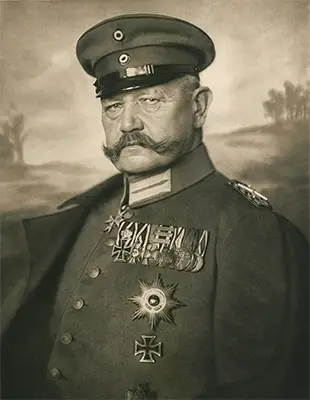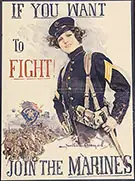Paul von Hindenburg
Paul von Hindenburg was born on October 2, 1847 in Prussia. His given name was Paul Ludwig Hans Anton von Beneckendorff und von Hindenburg (say that 3 times fast). His father was of aristocracy (Junker) as a Prussian officer. Hs mother came from a lower class of means and that did not set well with young Paul. He resented the fact his mother did not have title and breeding like that of his father. As much as possible he sought to ignore the side of his parentage that was less than gentry class.
Fond of his father’s class identity, Paul made all attempts to find favor with his father. He admired the military course that his father took and sought to replicate that in his own future. Paul would seek to emulate everything about his father that he could. Paul would spend a few years in local schools and began to see military service by the time he was 19.

Paul first was engaged in military operations at the battle of Koniggratz in 1866. He distinguished well in that battle and later in the Franco-Prussian War of 1870-1871. He served in the General Staff with his appointment of 1878. While there he was made a general in 1905.
Paul von Hindenburg made a decision to retire from the military 1911, so that he could spend time with his wife and children. However, that retirement was short-lived after only three years when WWI broke out in 1914. The Germans needed experienced officers. So Paul was recalled to active duty immediately at the onset of the war.
After a huge victory for Germany at Tannenburg, he was appointed Commander-in-Chief of the German armies in the Fall of 1914. His position was to lead the war being fought on the Eastern Front in Prussia.

In 1915, von Hindenburg is seen to have achieved victory at the battle of the Masurian Lakes where Russian forces were repelled. Paul is given the historic credit for the two victories achieved under his command; however, his Chief-of-Staff Erich Ludendorff is considered to have engineered the successes.
Because of victories of this nature General von Hindenburg is seen as a major hero for the German forces and is promoted to Field Marshall. He becomes Army Chief of Staff and has his close confidant and friend Ludendorff made his Quartermaster General. His friendship with Ledendorff will play an important role in the months ahead.

The two men join with other military officers and businessmen to form an organization known as the ‘Third Supreme Council’. This council grew to gain most of the power that existed in Germany. This consortium of new government managed to advance the military victories being seen in Germany during this war. But by September 1918, the rule of the Reichstag would regain their powerbase.
By now it is seen that von Hindenburg is more the known figurehead of the German Army successes and Ludendorff is the actual brains behind what is happening. The German position is making end roads of success by basically halting the Allied forward progress. A strengthened Hindenburg line is formed that is seen as a formidable barrier.

By 1917, Russia is soon defeated and exits the war, leaving only Britain, France and America as the main Allied position. In 1918, the German Army created what is probably the largest offensive push in WWI. Hindenburg and Ludendorff believed that by bringing their troops from the Eastern Front (since Russia withdrew from the war), they had the means to not only halt the Allies, but to push them back.
With French and British troops built up near the European coast, the Germans noted a weakness in one position and sought to walk through that position with ease of victory. Hindenburg had developed the German troops to travel light, thus not being burdened by he packs and weaponry. This method of attack would also lead to the German eventual loss of the war.

Hindenburg’s lightly packed troops also lacked necessary supplies for the continued advance on Paris and other hallmark locations. The supply lines were now open to Allied attacks and destruction. Added to this was that the American advance was making Allied positions more formidable and successful.
After eventual huge losses during this one offensive (over one million German Soldiers killed), WWI finally came to an end.
After the war Hindenburg became President of Germany until his passing in 1932.



